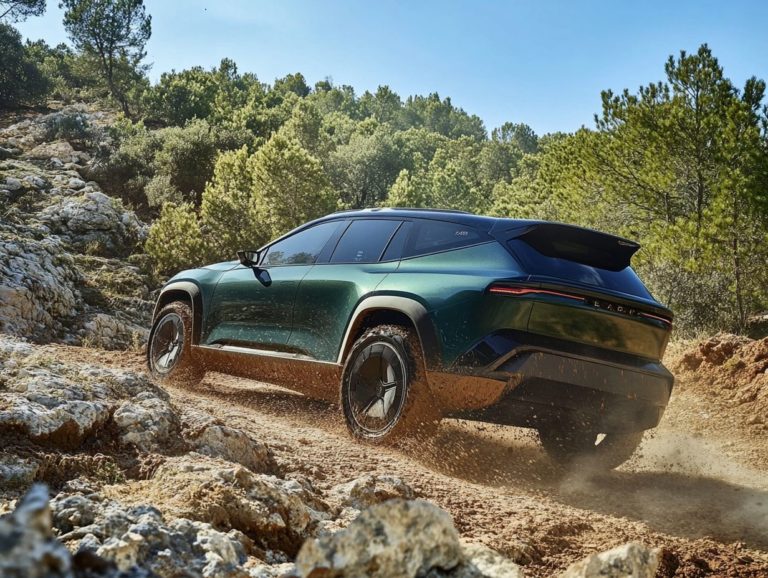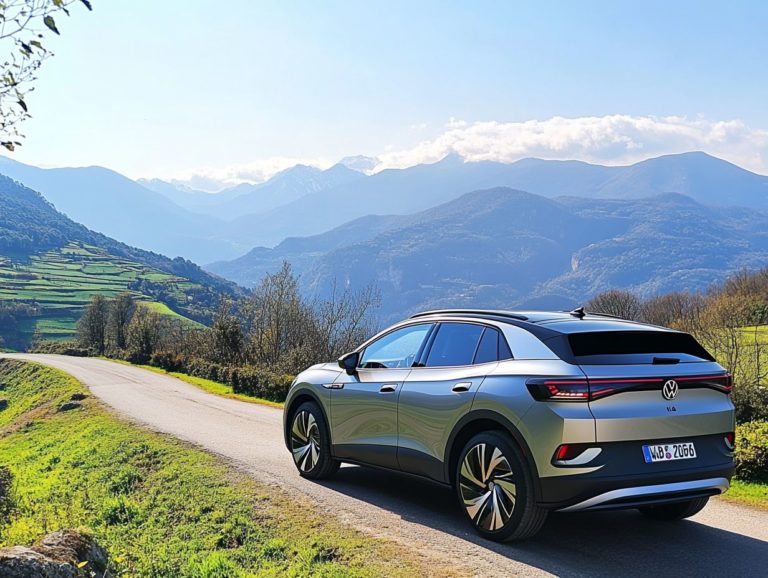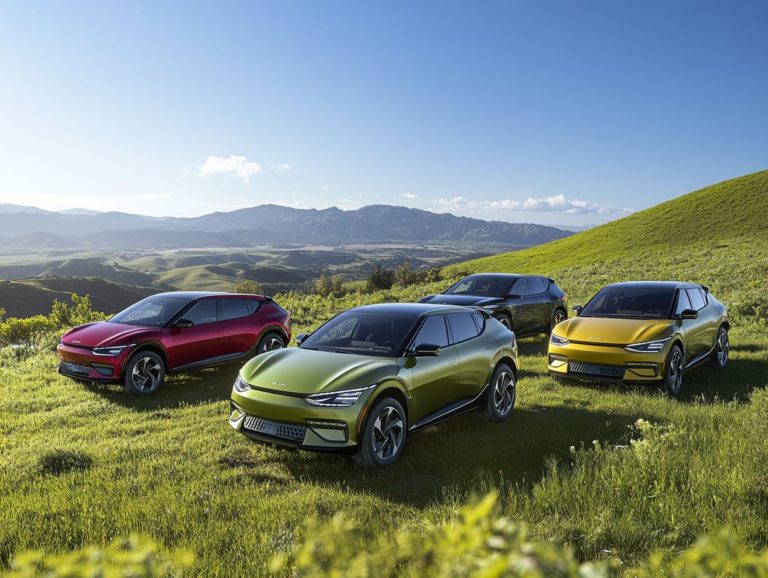A Guide to EV Home Charging Solutions
As electric vehicles (EVs) become increasingly popular, the convenience of home charging is a game-changer for drivers looking to enhance their electric vehicle experience.
This article delves into the array of charging solutions at your disposal, ranging from Level 1 to DC fast charging, while highlighting the key factors to consider when choosing the right option tailored to your needs.
You ll also find valuable installation and maintenance tips, along with insights into advancements that are set to revolutionize the future of home EV charging.
Prepare to elevate your electric driving experience!
Contents
- Key Takeaways:
- Types of EV Home Charging Solutions
- Factors to Consider When Choosing a Charging Solution
- Installation and Maintenance of EV Charging Stations
- Future of EV Home Charging
- Frequently Asked Questions
- What is EV Home Charging and why do I need it?
- What are the different types of EV Home Charging solutions available?
- How do I choose the right EV Home Charging solution for my needs?
- Can I install an EV Home Charging solution by myself?
- Are there any government incentives for installing an EV Home Charging solution?
- Is it possible to use renewable energy to power my EV Home Charging solution?
Key Takeaways:
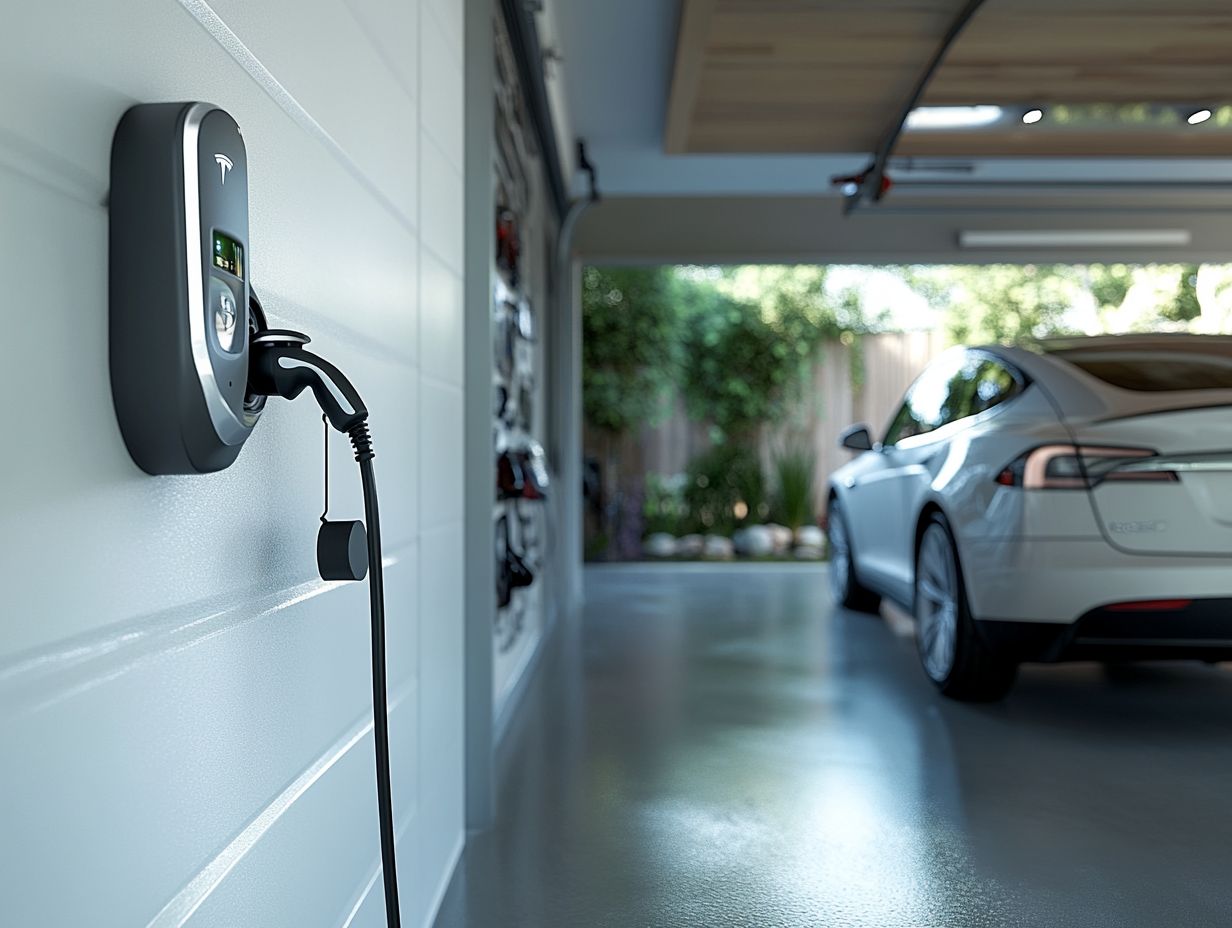
- Charging your EV at home is convenient and cost-effective, making it the preferred option for many EV owners.
- Level 1, Level 2, and DC fast charging are the different types of EV home charging solutions, each with its own benefits and limitations.
- When choosing a charging solution, consider factors such as power capacity, compatibility, cost, and installation process to find the best fit for your needs.
Why Charge Your EV at Home?
Charging your electric vehicle (EV) at home is not just a convenience; it s a smart financial move that more and more EV drivers are embracing.
With a range of charging solutions at your disposal, including dedicated home chargers, you can effectively lower your energy consumption while ensuring your electric car is primed and ready for your next adventure.
Home charging typically offers lower residential electricity rates compared to public stations, allowing you to tailor the setup to your specific needs, factoring in battery size and desired charging speed.
Home charging also saves you the trouble of hunting for a public station. It gives you the power to charge your vehicle overnight, taking advantage of off-peak electricity rates. This can lead to substantial savings over time, particularly beneficial for those who commute regularly.
Dedicated home chargers often provide faster charging speeds than standard outlets, so you can enjoy a fully charged vehicle in significantly less time.
By choosing home charging, you can truly customize your experience, aligning your energy consumption with your lifestyle while minimizing dependence on potentially expensive public options.
Types of EV Home Charging Solutions
When evaluating EV home charging solutions, it’s crucial to grasp the various types available, each thoughtfully crafted to cater to distinct charging needs and preferences. For a deeper insight, check out this simple guide on understanding EV charging levels.
You can choose Level 1 chargers that plug into a standard 120V outlet for a convenient, if slower, charging experience. Alternatively, Level 2 chargers, which require a 240V outlet, offer significantly faster charging speeds.
For those who prioritize efficiency, some residential setups even feature DC fast charging options, providing rapid charging tailored to a diverse array of electric vehicle models.
Level 1 Charging
Level 1 charging is the most fundamental way to charge your EV at home, using a standard 120V outlet that you ll find in almost any residential space.
While it s great for overnight charging, it does come with the slowest charging speed, making it more suited for electric vehicles with smaller batteries or for those who typically drive shorter distances each day.
One significant advantage of this method is how easily accessible it is; there s no need for you to install any special equipment.
However, the downside is that it might not cater to those with longer commutes or larger battery capacities, as charging times can extend to over 12 hours for a full charge. This is especially crucial for anyone who often depends on their vehicle for longer trips.
As energy consumption can stack up over time, it s wise to consider your daily energy needs. Ultimately, while Level 1 charging serves as a solid starting point for many electric vehicle owners, it may not be the most efficient option for everyone.
Ready to invest in a home charging solution? Take the next step towards a more convenient EV ownership experience!
Level 2 Charging
Level 2 charging is an efficient choice for electric vehicle owners. It utilizes a 240V outlet to deliver significantly faster charging speeds than Level 1 charging. This method is especially beneficial for electric vehicles with larger battery capacities. You can charge your EV in shorter time frames perfect for daily commuters or those with higher energy demands.
To fully leverage the benefits of Level 2 charging, you’ll typically need to install a dedicated home charger. Costs vary based on the model and installation complexity. While the initial investment might raise eyebrows, quicker charging times can ultimately lower your overall electricity expenses and enhance your convenience.
Level 2 chargers can generally power up your EV in just a few hours, a stark contrast to the lengthy overnight charging required with Level 1. This makes Level 2 charging an appealing option for anyone who values driving efficiency and minimal downtime.
DC Fast Charging
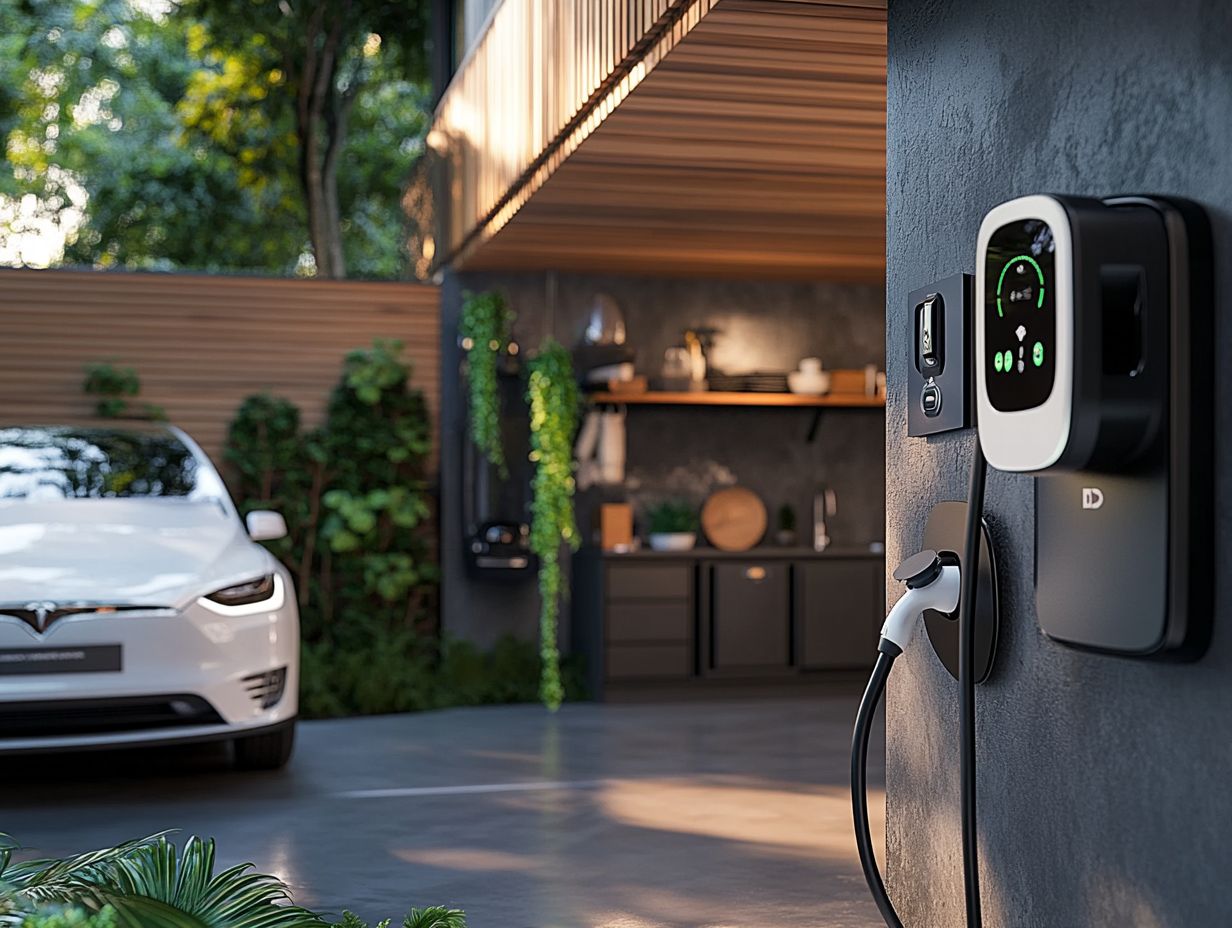
DC fast charging represents the pinnacle of EV charging solutions. It provides rapid power output to electric vehicles, making it the ideal choice for long-distance travel and quick pit stops. This method usually requires specialized charging stations that aren t typically found at home. Nevertheless, it plays a vital role in the overall electric mobility framework, complementing your residential charging options.
By placing these high-voltage charging stations strategically along major highways and at convenient locations, you can travel with confidence. There s always a reliable spot to recharge when necessary. These stations boast impressive charging speeds, often replenishing your vehicle’s battery to around 80% in under 30 minutes, significantly cutting down on downtime during your journeys.
This expanding network energizes the adoption of electric vehicles! It eases range anxiety, which is the fear of running out of battery power. DC fast charging enhances the practicality of electric vehicles, paving the way for them to stand shoulder to shoulder with traditional combustion engine cars.
Factors to Consider When Choosing a Charging Solution
Choosing the ideal charging solution for your electric vehicle requires thoughtful evaluation of several key factors. Consider power capacity, compatibility with your EV, installation costs, and the existing infrastructure of your home s electricity.
Assess your unique needs and lifestyle to ascertain whether a Level 1 or Level 2 charger is most suitable. Consider the potential impacts on your energy consumption and residential electricity rates.
Power Capacity and Compatibility
Evaluating the power capacity and compatibility of your charging solution is essential for ensuring an efficient charging experience for electric vehicle (EV) drivers. Different electric vehicles come with varying battery sizes and charging requirements. Understanding these specifications will guide you in selecting a charger that meets your vehicle’s energy demands without compromising safety or performance.
Start by considering the total amount of electricity in your vehicle’s battery, as this directly impacts charging time and the type of equipment you ll need. It’s also crucial to examine your vehicle’s maximum charging rate, which indicates how swiftly your battery can accept energy. Aligning this with a charging station that offers compatible power output ensures your vehicle charges optimally.
Assess your home electrical system s capacity to prevent overloads and inefficiencies. A thoughtful evaluation of these factors can lead to a seamless and sustainable driving experience.
Take charge of your electric vehicle journey today by evaluating your options!
Cost and Installation Process
The cost and installation process for EV charging solutions can vary significantly, typically ranging from 670 to 1,600. This variation hinges on factors such as the type of equipment chosen and the complexity of the installation. When evaluating the ideal charging setup for your needs, consider both the initial costs and the long-term residential electricity rates.
Different types of charging stations come with distinct expense profiles. Level 1 chargers are often more budget-friendly and simpler to install, but they may require longer charging times for your electric vehicle, affecting your overall electricity consumption. In contrast, Level 2 chargers have higher upfront costs due to installation requirements like dedicated circuits, yet they provide faster charging times. Fast charging can save you energy costs in the long run.
Explore local incentives to help offset installation costs. These incentives can enhance the overall value of your chosen charging solution, making it a smarter investment for your electric vehicle journey.
Installation and Maintenance of EV Charging Stations
The installation and maintenance of EV charging stations are essential for ensuring optimal performance and safety. Consider the choice between DIY installation and hiring a professional. Both options have their benefits.
Understanding the requirements for either option empowers you to make an informed decision that aligns with your charging needs while prioritizing safety precautions.
DIY vs Professional Installation
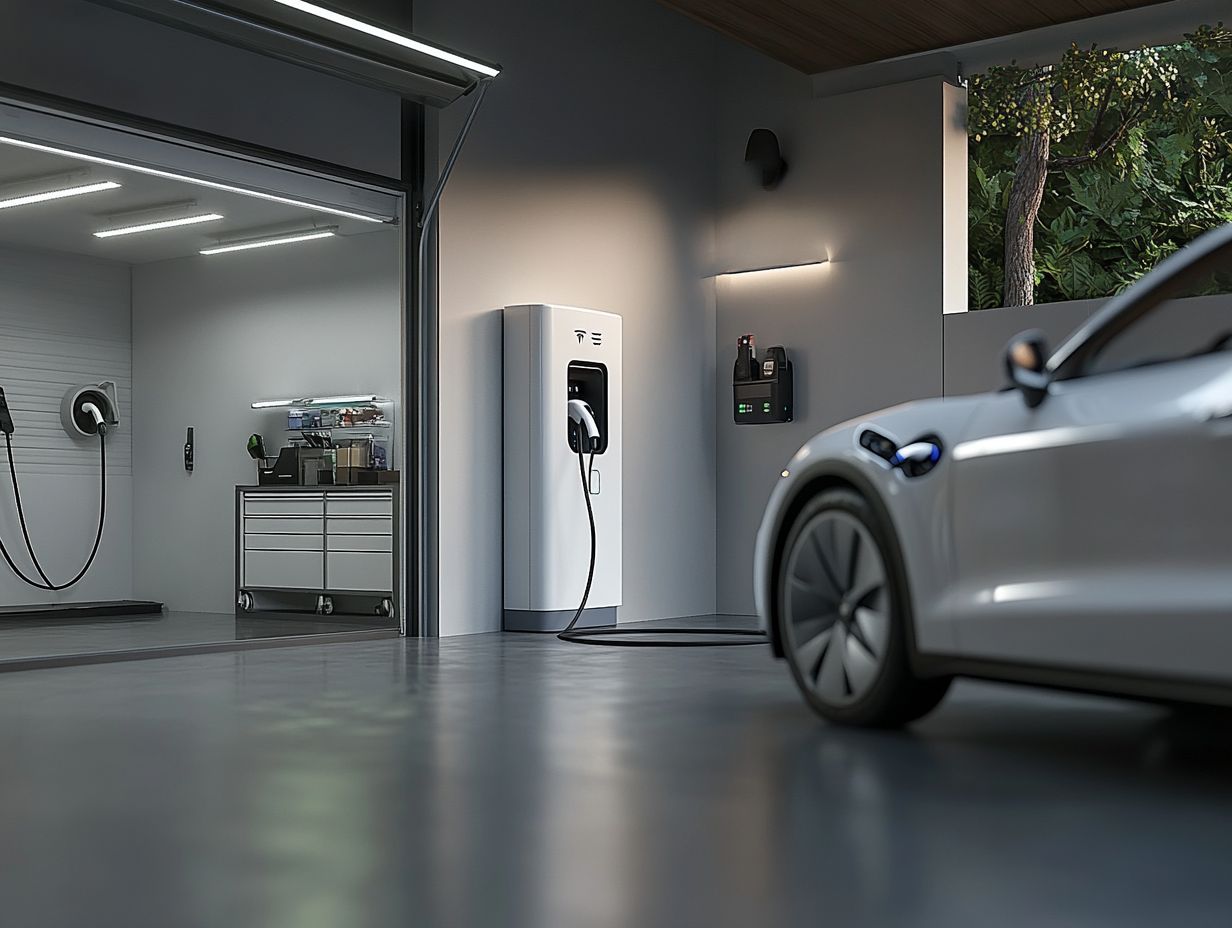
When you consider installing EV charging stations, you’ll face a choice between a DIY approach and professional installation, each offering distinct advantages and challenges.
Taking the DIY route can lead to impressive cost savings and allows you to customize the system to fit your specific needs. However, this requires basic electricity knowledge and adherence to local safety standards. If the installation isn’t done correctly, you could create hazardous situations that might jeopardize your household’s safety.
Opting for professional installation brings peace of mind, as certified experts ensure that all components are installed according to industry regulations, significantly reducing the risk of malfunctions. While this option may come with higher upfront costs, the long-term security and functionality of the charging station often make it a worthwhile investment.
Regular Maintenance and Troubleshooting
Regular maintenance and troubleshooting of your EV charging station are essential for ensuring its efficient and safe operation over time. Familiarizing yourself with common issues and their solutions can prevent disruptions in charging and extend the lifespan of your equipment.
Routine checks like inspecting cables for wear and tear, ensuring secure connections, and keeping the station free from debris are crucial for maintaining functionality. Stay on top of software updates, as these often include vital fixes and enhancements. Also, be mindful of specific safety precautions, such as turning off power before any maintenance tasks.
By implementing these key practices, you can effectively identify potential issues early on and apply suitable troubleshooting techniques. This ensures the station’s reliability and guarantees a safe charging experience for you and others.
Future of EV Home Charging
Get ready for remarkable innovation in EV home charging, as advancements in technology and infrastructure are making it smarter, more efficient, and accessible to every electric vehicle owner!
Expect to see emerging trends like smart charging solutions, designed to optimize energy consumption and enhance charging speed. This will instantly streamline your charging experience and contribute significantly to a more sustainable electric mobility ecosystem.
Advancements in Technology and Infrastructure
Recent advancements in technology and infrastructure are revolutionizing the landscape of EV home charging. Innovations focus on enhancing both charging speed and user experience.
Smart charging solutions lead the way, allowing you to manage energy use more effectively and use renewable energy, marking a significant leap toward a more sustainable electric mobility future.
Imagine saying goodbye to messy cables! Wireless charging technology makes this possible, bringing convenience to your electric vehicle charging experience. When paired with smart technology that learns your habits, these advancements don t just optimize electricity usage; they also analyze driving patterns to refine your charging schedules.
As you embrace electric mobility trends, look forward to a more responsive and efficient charging infrastructure that minimizes downtime and maximizes battery life, ultimately paving the way for a greener transportation ecosystem.
Frequently Asked Questions
Welcome to our FAQ section on EV home charging! Here, you’ll find answers to the common questions about electric vehicle charging solutions.
What is EV Home Charging and why do I need it?

EV Home Charging refers to the process of charging an Electric Vehicle (EV) at home. It is necessary for EV owners because it allows them to conveniently charge their vehicles at their own residence, eliminating the need to visit public charging stations.
What are the different types of EV Home Charging solutions available?
- Level 1: Uses a standard household outlet and provides the slowest charging speed.
- Level 2: Requires a dedicated circuit and provides faster charging.
- Level 3: Also known as DC Fast Chargers, these provide the fastest charging speed but are more expensive.
How do I choose the right EV Home Charging solution for my needs?
Choosing the right EV home charging solution depends on several factors, such as your budget, the availability of charging options in your area, and your daily driving habits. For more insights, consider charging at home: what you need to know. It is best to consult with a professional to determine the most suitable solution for your specific needs.
Can I install an EV Home Charging solution by myself?
It is not recommended to install an EV Home Charging solution by yourself, as it involves electrical work and can be dangerous if not done correctly. It is best to hire a licensed and experienced electrician who can ensure a safe and proper installation.
Are there any government incentives for installing an EV Home Charging solution?
Yes, many governments around the world offer incentives for installing EV Home Charging solutions, such as tax credits or rebates. It is recommended to research local and federal incentives that may be available to you.
Is it possible to use renewable energy to power my EV Home Charging solution?
Yes, it is possible to use renewable energy, such as solar or wind power, to charge your EV at home. This not only reduces your carbon footprint but can also save you money on electricity costs in the long run.
Ready to power your drive? Explore your options for electric vehicle home charging today!

